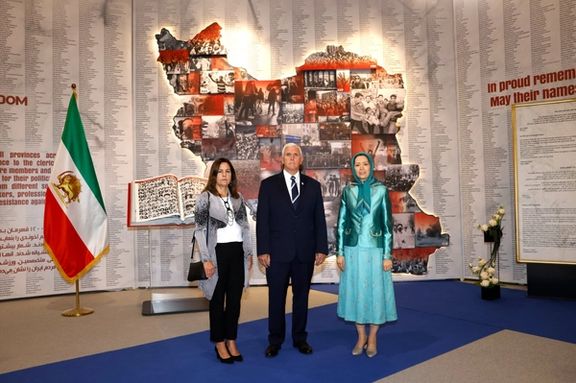Ex-Vice President Pence Visits Controversial Iranian Group In Albania

Former US Vice President Mike Pence has visited the camp in Albania of the Iranian Mujahedin-e Khalq (MEK), denouncing the Iranian regime for its “brutality.”

Former US Vice President Mike Pence has visited the camp in Albania of the Iranian Mujahedin-e Khalq (MEK), denouncing the Iranian regime for its “brutality.”
Pence, who traveled to Albania to visit the Ashraf-3 camp 30 kilometers (19 miles) west of Albania’s capital, Tirana, home to some 3,000 Iranian exiled dissidents from the MEK on Thursday, urged the Biden administration “to immediately withdraw from all nuclear negotiations with Tehran, voice support for the organized opposition in Iran, and make it clear that America and our allies will never permit the regime in Tehran to obtain a nuclear weapon.”
Pence described Iranian President Ebrahim Raisi as “a brutal mass murderer responsible for the 1988 massacre of 30,000 political prisoners,” noting that his election was “intended to quash internal dissent and intimidate the people of Iran into remaining silent.”
The estimated number of prisoners killed in 1988 is around 5,000, however MEK insists 30,000 were massacred.
Pence warned that “a renewed deal with Iran won’t block Iran’s path to a nuclear bomb,” adding that a deal would not “benefit the people of Iran in any way but “merely empower and enrich a corrupt regime that has tormented and tortured the Iranian people for generations.”
In May, former Secretary of State under President Donald Trump Mike Pompeo also paid a visit to the camp in Albania.
Some Iranian dissidents criticize US officials' visit to the MEK center in Albania, as they regard the organization as non-democratic.
The Islamic Republic holds the MEK responsible for bombings in Iran in 1980s and for its alliance with Saddam Hussein until his overthrow in 2003. The United States relocated the opposition group from Iraq to Albania in 2013 as pro-Tehran Shiite groups were attacking the MEK and Kurds were demanding to hold the organization accountable for siding with Saddam.